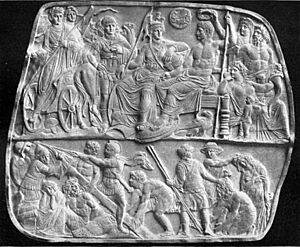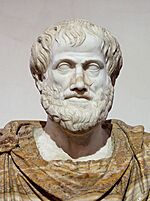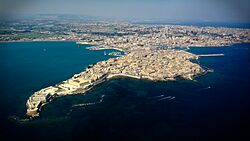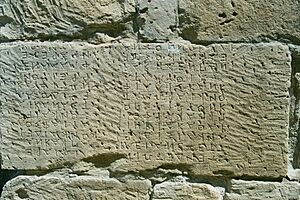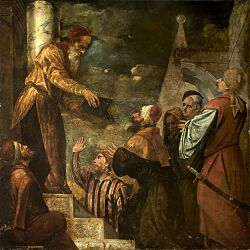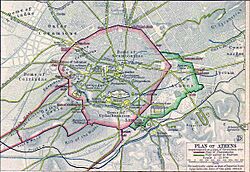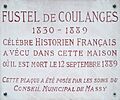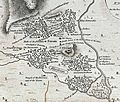Polis facts for kids
Quick facts for kids
Ancient Greek Polis
πόλις
|
|
|---|---|
|
Constitutional Microstate
|
|
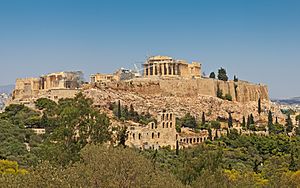
The Acropolis of Athens, a famous polis in Classical Greece. The polis was the whole city, including its walls. The Acropolis was the "city heights," not a city on its own.
|
|
| Etymology: "walls" | |
| Government | |
| • Type | Republic, or commonwealth. Citizens held the main power, even though how they were governed changed a lot. |
| • Body | The assembly, or ekklesia. Day-to-day tasks were done by leaders called archons. |
| Area | |
| • max area of 60% of poleis | 100 km2 (40 sq mi) |
| • max area of 80% of poleis | 200 km2 (80 sq mi) |
| Population
(400 BC)
|
|
| • Total | 7,500,000+ |
| Demonym(s) | Dēmos in the Attic-Ionic dialects or dãmos in the Doric. The demonym was formed by producing the name of a people from the name of the polis. For example, the polis of Athens was named Athenai after the goddess Athena; hence the demos was the Athenaioi, "the Athenians." |
The word polis (plural poleis) means 'city' in ancient Greek. It was much more than just a place with buildings. An ancient Greek polis was like a small country. It had its own rules, its own land, and its own citizens. People living in a polis felt very loyal to it. They saw it as their homeland.
These poleis were not just in modern-day Greece. From 1993 to 2003, a study found about 1500 poleis. They were spread across the Mediterranean and Black Seas. They stretched from the Caucasus mountains to Spain, and from Russia to Egypt. Many of these places are still cities today, like Marseilles and Syracuse. But they are no longer Greek poleis.
Sometimes, a polis would send people to start a new settlement. This new settlement was called a colony. The original polis was called the "mother city" or metropolis. Colonies helped spread Greek culture. They also helped when the population grew too large in the mother city.
Not all poleis were only for Greek-speaking people. For example, the city of Carthage was called a polis by ancient Greeks. Carthage was a Phoenician-speaking city. Some Greek colonies also included people who did not speak Greek.
What Was a Polis?
The word polis was used thousands of times in ancient Greek writings. It often meant 'state' or 'community'. Ancient Greek thinkers like Plato and Aristotle studied what a polis truly was. They wanted to understand what made a good or ideal polis.
Plato's Ideal Polis
Plato wrote about the polis in his famous book, The Republic. He believed the best polis was one that worked for everyone's good. Plato thought a "philosopher king" would be the best ruler. This ruler would be wise and guide the polis like a ship.
Plato described five main groups of people in an ideal polis:
- Producers (like farmers and craftspeople)
- Merchants (people who buy and sell goods)
- Sailors and shipowners
- Retail traders (shopkeepers)
- Wage earners (people who work for pay)
Plato also said a "just city" needed four main qualities:
- Wisdom
- Courage
- Moderation
- Justice
Aristotle's View of the Polis
Aristotle was a student of Plato, but he had his own ideas. He studied real poleis to understand how they worked. He sent his students to learn about different governments. Aristotle's writings, like Politics, are still studied today.
Aristotle believed a polis was a group of citizens. He said a polis had three key parts:
- A specific location
- A population
- A constitution (a set of laws and rules)
If any of these changed a lot, it would become a different polis.
How Poleis Were Formed
Many poleis were formed when smaller groups came together. This process was called synoecism. It means "living together" or "forming one city." Sometimes, this meant building a new central city. Other times, it meant different villages agreeing to share one government.
For example, Theseus supposedly united the settlements around Athens into one city. This was a political synoecism. It created a stronger, more unified polis.
The Polis as a Community
Aristotle also said a polis was a koinonia, or a community. He compared it to a human body, where all parts work together. People naturally want to live in communities.
Families were the smallest units of the polis. Several families formed a village (kome). A polis was a community of villages. It had to be large enough to be self-sufficient. This means it could provide for all its own needs.
Aristotle believed that for a polis to work, people needed to share some things. But they also needed to own private property. If everything was owned by everyone, no one would take care of it. He thought that people owning their own things and trading with each other made the polis strong.
Citizenship in a Polis
In a polis, the population was divided into citizens and non-citizens. Citizens (called politai) had rights and duties. They were expected to take part in the government. Non-citizens included foreigners, slaves, and women.
According to Aristotle, a citizen was someone who could take part in the government. This is like a republic today. Citizens usually took an oath to follow the laws.
Citizenship was often passed down from parents. However, the government could choose who became a citizen. They could also remove someone's citizenship.
Even though women were not usually active citizens, they were still important. They were considered "female citizens" (astai). They passed on citizen status to their children.
Sometimes, rules about citizenship changed. For example, in Athens, Solon changed the laws. He made it illegal to sell people into slavery for debt. He also allowed poor people to attend assemblies and serve on juries. This shows that citizenship could be flexible.
The Polis as a State
The word "politics" comes from polis. It means dealing with the affairs of the polis. Politeia meant the government itself. The government handled things like justice, public order, and leading the military.
A polis was a constitutional republic. This means it had a set of laws (a constitution) that everyone followed. These laws decided who could govern and who could not. The polis demanded the highest loyalty from its people.
The people of a polis were called its demos. This word could mean the whole population. It could also mean a smaller part of the polis, like a neighborhood or district. In Athens, these districts were called demes. They were important for how the city was run.
The demos was not just a group of people who happened to live together. It was a group that had decided to unite. They agreed to form a single, strong community. This unity was what made a polis special.
Images for kids
-
Monaco, a modern city-state. It looks very different from an ancient Greek polis.
See also
 In Spanish: Polis para niños
In Spanish: Polis para niños


